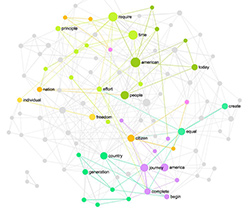Posted by Nodus Labs | November 4, 2012
Embodied Cognition in Legal Contexts

Embodiment is not an emergent topic in cognitive science, however, some of its very basic tenets are still not part of common-sense thinking. A very interesting paper in Topics in Cognitive Science “Four Applications of Embodied Cognition” (Davis et al 2012) gives a brief account of four different practical applications of embodied cognition.
The first example cites another paper (Schnall, Benton, & Harvey, 2008) where the authors found that environment directly affects our decision-making process. They conducted an experiment where study subjects had to make moral judgement about some issue after watching a scene from a disgusting movie. Half of them were asked to wash their hands before making the decision, and half of them weren’t. Those who had to wash hands ended up giving much more severe moral judgements. Other research they cite points to the importance of interior and sensorimotor experiences present in the courtroom, which affect decision-making processes.

